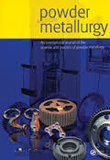
POWDER METALLURGY
Scope & Guideline
Elevating Knowledge in Materials Chemistry and Mechanics
Introduction
Aims and Scopes
- Additive Manufacturing and Powder Processing:
The journal emphasizes research on various additive manufacturing techniques, particularly those involving powders, such as binder jetting and metal injection molding. This includes studies on the properties and performance of materials produced through these methods. - Microstructural Analysis and Material Properties:
A significant focus is placed on understanding the microstructural evolution of materials processed by powder metallurgy. This includes examining the mechanical properties of sintered components and the effects of various processing parameters. - Sustainability in Powder Metallurgy:
The journal addresses sustainability issues related to powder metallurgy, including the development of eco-friendly materials and processes, as well as the incorporation of recycled materials in powder formulations. - Technological Innovations and Trends:
Research on the latest technological advancements in powder metallurgy, including new techniques, equipment, and methodologies for improving production efficiency and material performance. - Industry Applications and Case Studies:
The journal frequently publishes case studies and reports that highlight practical applications of powder metallurgy in various industries, showcasing real-world implementations and their outcomes.
Trending and Emerging
- Sustainability Initiatives:
There is a growing emphasis on sustainability within the powder metallurgy sector, with research focusing on eco-friendly practices, the use of recycled materials, and the development of sustainable alloys. - Integration of Artificial Intelligence:
The application of artificial intelligence in the design, optimization, and characterization of powder metallurgy processes is on the rise, indicating a trend towards leveraging advanced technology to enhance manufacturing efficiency. - Advanced Characterization Techniques:
Emerging themes include the use of advanced characterization methods, such as quantitative metallography and fractography, to better understand the performance and reliability of powder metallurgy components. - Research on Composite Materials:
There is an increasing interest in the development and application of composite materials within powder metallurgy, reflecting a trend towards creating materials with tailored properties for specific applications. - Fatigue and Mechanical Performance Studies:
Recent publications have emphasized the investigation of fatigue performance and mechanical properties of sintered materials, particularly in relation to their applications in demanding environments.
Declining or Waning
- Traditional Powder Metallurgy Techniques:
There is a noticeable reduction in research focused on traditional techniques such as conventional sintering and powder pressing, as the field increasingly shifts towards innovative methods like additive manufacturing. - Basic Theoretical Studies:
The journal has seen fewer publications dedicated to fundamental theoretical studies of powder metallurgy processes, with a growing preference for applied research that demonstrates practical applications and outcomes. - Single-Material Studies:
Research focusing solely on single-material systems is declining, as there is an increasing interest in multi-material and composite systems that offer enhanced properties and functionalities.
Similar Journals

PHYSICS OF METALS AND METALLOGRAPHY
Advancing Knowledge in Metals and Their MysteriesPhysics of Metals and Metallography, published by MAIK Nauka/Interperiodica/Springer, is a respected journal dedicated to the study of the physical properties of metals and their metallographic analysis, offering invaluable insights for researchers, professionals, and students in the fields of condensed matter physics and materials chemistry. With an ISSN of 0031-918X and an E-ISSN of 1555-6190, the journal has a rich history that spans from 1970 to 2024, reflecting a long-standing commitment to advancing knowledge in this vital area of materials science. Although it currently does not offer Open Access options, its strong placement in the academic landscape is underscored by its Q3 ranking in both Condensed Matter Physics and Materials Chemistry, according to 2023 metrics, and a Scopus ranking that places it within the competitive percentile of its fields. The journal is particularly important for those engaged in the cutting-edge research and technological applications of metals and alloys, making it an essential resource for anyone looking to deepen their understanding or contribute original findings to this dynamic discipline.

POWDER METALLURGY AND METAL CERAMICS
Pioneering Research in Advanced Material DevelopmentPOWDER METALLURGY AND METAL CERAMICS is a prestigious journal published by Springer, dedicated to advancing the field of powder metallurgy and the development of metal ceramics. With an ISSN of 1068-1302 and an E-ISSN of 1573-9066, this journal includes significant research contributions that explore innovative developments in materials science and engineering. Since its inception in 1993, it has garnered attention within multiple disciplines, consistently ranking in the Q2 and Q3 quartiles across categories such as Metals and Alloys, Ceramics and Composites, and Mechanics of Materials. The journal offers valuable insights into the synthesis, characterization, and applications of advanced materials, making it an essential platform for researchers, professionals, and students aiming to stay at the forefront of technological advancements in this dynamic field. Although not currently offering open access, the journal remains a critical resource for disseminating high-quality research that influences both academia and industry.

RARE METAL MATERIALS AND ENGINEERING
Shaping the Future of Metallurgy and EngineeringRARE METAL MATERIALS AND ENGINEERING is a vital academic journal dedicated to advancing the fields of materials science, engineering, and metallurgy. Published by the NORTHWEST INST NONFERROUS METAL RESEARCH in China, this journal has been an essential resource for researchers and professionals since its inception in 1993. With a focus on rare metals and their engineering applications, the journal addresses contemporary issues and innovations in materials chemistry and electronic engineering, providing insights into the properties and uses of advanced materials. Although it currently falls within the Q4 category for several categories, including Electrical and Electronic Engineering and Materials Chemistry, its commitment to quality and relevance in the field is evident. The journal offers a platform for researchers to share their findings with the scientific community, fostering collaboration and knowledge exchange in an important area of study. Researchers and students interested in exploring the latest in rare metal technologies and engineering methodologies will find this journal a valuable addition to their academic library.

JOM
Elevating the discourse in materials science.JOM, published by Springer, is a leading academic journal dedicated to advancing research in the fields of Engineering and Materials Science. With an ISSN of 1047-4838 and an E-ISSN of 1543-1851, JOM has established itself as a reputable source of scholarly articles, contributing significantly to the understanding and development of materials and their applications in engineering. As of 2023, it ranks in the second quartile (Q2) in both the Engineering (miscellaneous) and Materials Science (miscellaneous) categories, showcasing its influence and academic rigor. With a Scopus rank of #84 in General Engineering and #212 in General Materials Science, JOM is positioned as a vital resource for academics and professionals aiming to stay abreast of the latest research trends and innovations. Although the journal does not currently offer open access options, its commitment to quality publishing continues to make it an essential read for researchers and students alike, fostering a collaborative environment for growth and discovery in the materials science community.
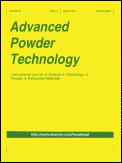
ADVANCED POWDER TECHNOLOGY
Unleashing Potential in Chemical EngineeringADVANCED POWDER TECHNOLOGY, published by Elsevier, is a premier academic journal dedicated to advancing the field of powder technology and its applications across various domains, such as chemical engineering and materials science. With an ISSN of 0921-8831 and an E-ISSN of 1568-5527, this journal has established itself as a leader in research dissemination, boasting an impressive Q1 ranking in both Chemical Engineering (miscellaneous) and Mechanics of Materials as of 2023. Further enhancing its reputation, it ranks 42nd out of 398 in the field of Mechanics of Materials and 36th out of 273 in General Chemical Engineering, demonstrating its significant impact within these disciplines. With a publishing history spanning from 1990 to 2024, ADVANCED POWDER TECHNOLOGY offers a wealth of knowledge and research findings, positioning itself as an indispensable resource for researchers, professionals, and students eager to explore cutting-edge advancements and applications of powder systems. Access to its latest research is available through institutional subscriptions, ensuring efficiency and support for ongoing academic endeavors.
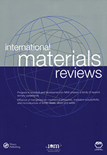
INTERNATIONAL MATERIALS REVIEWS
Connecting Theory and Practice in Materials EngineeringINTERNATIONAL MATERIALS REVIEWS, published by SAGE Publications Inc, is a leading journal dedicated to the comprehensive analysis of contemporary research in the fields of materials chemistry, mechanical engineering, mechanics of materials, and the study of metals and alloys. With an impressive impact factor and a Q1 ranking across multiple categories such as Materials Chemistry and Mechanical Engineering in 2023, it ranks amongst the top journals for innovative materials research. The journal has a long-standing history since its inception in 1987 and continues to serve as a crucial resource for academics and professionals alike. Although it is not open access, it is renowned for its rigorous peer-review process and its commitment to disseminating high-quality materials science research globally. Researchers, students, and industry professionals benefit greatly from the journal's insightful reviews, both for the advancement of theoretical knowledge and practical applications within the fast-evolving materials field.
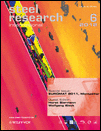
STEEL RESEARCH INTERNATIONAL
Transforming Ideas into Steel Solutions.STEEL RESEARCH INTERNATIONAL, published by WILEY-V C H VERLAG GMBH, is a premier journal that serves as a vital source of knowledge in the fields of condensed matter physics, materials chemistry, and metal and alloy research. With an ISSN of 1611-3683 and an E-ISSN of 1869-344X, this journal provides open access options that enhance its visibility and accessibility. Recognized for its scientific merit, it currently holds a Q2 ranking across multiple categories including Condensed Matter Physics and Materials Chemistry. This translates to an exceptional placement within the 64th percentile for Metals and Alloys and substantial recognition in other related fields according to Scopus rankings. By bridging theoretical concepts and practical applications, STEEL RESEARCH INTERNATIONAL aims to foster innovative research and dissemination of knowledge among researchers, professionals, and students focused on advancing the metallurgy and materials science domains. With a commitment to remain at the forefront of research from 2003 to 2024, the journal is poised to continue shaping the future of steel and alloy studies.
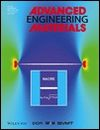
ADVANCED ENGINEERING MATERIALS
Unlocking the Potential of Innovative MaterialsADVANCED ENGINEERING MATERIALS is a leading journal dedicated to the field of materials science, particularly within the realm of condensed matter physics. Published by WILEY-V C H VERLAG GMBH in Germany, this esteemed journal has been a crucial platform for disseminating cutting-edge research since its inception in 1999. With an impressive impact factor and ranked in the top quartiles of its categories, it boasts a Q1 ranking in Condensed Matter Physics and a Q2 rank in related materials science fields as of 2023. ADVANCED ENGINEERING MATERIALS serves a diverse readership, including researchers, industry professionals, and students, striving to advance the understanding and application of innovative materials. Frequent contributions to this journal help bridge theoretical advancements with practical applications, fostering a vibrant academic and industrial dialogue. Although currently not an open-access journal, the insights shared within its pages are pivotal for anyone engaged in the dynamic sectors of engineering and material sciences.
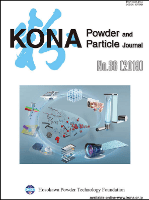
KONA Powder and Particle Journal
Unlocking the science of particles, one study at a time.KONA Powder and Particle Journal, published by the HOSOKAWA POWDER TECHNOL FOUNDATION since 1983, is a leading open-access journal dedicated to advancing research in the fields of powder technology and particle science. Situated in Japan, this journal serves as a vital platform for researchers, professionals, and students, offering a wealth of knowledge on various applications and innovations in Chemical Engineering, Chemistry, Engineering, and Materials Science. With an impressive Q2 ranking across multiple categories in 2023 and notable Scopus rankings that position it among the top journals in its field, KONA fosters collaboration and discovery by providing immediate and unrestricted access to groundbreaking research. The journal not only promotes the dissemination of high-quality articles but also emphasizes the practical implications of powder and particle technology in real-world applications, making it an essential resource for advancing scientific knowledge and industrial practices.

International Journal of Minerals Metallurgy and Materials
Advancing Knowledge in Minerals and Materials ScienceThe International Journal of Minerals Metallurgy and Materials, published by SPRINGER, stands as a prominent forum in the fields of minerals, metallurgy, and materials science. With an ISSN of 1674-4799 and an E-ISSN of 1869-103X, this journal has been disseminating high-quality research since its inception in 2009 and will continue to publish until 2024. Based in China, this journal supports Open Access options, maximizing the reach and impact of scholarly work. Enhanced by its impressive Scopus rankings, it holds a Q2 position in Geochemistry and Petrology and a Q1 ranking in Materials Chemistry, Mechanical Engineering, Mechanics of Materials, and Metals and Alloys for 2023. Such accolades reflect its continual commitment to advancing knowledge in these disciplines, making it essential reading for researchers, professionals, and students aiming to stay abreast of contemporary developments and innovative solutions in materials science.